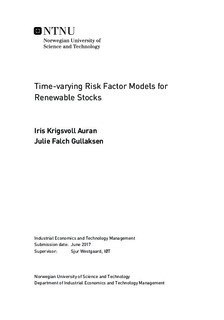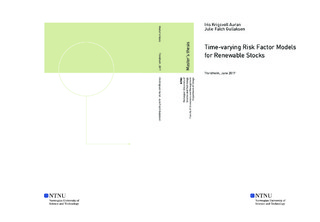| dc.description.abstract | Despite the considerable growth in the renewable energy market during recent years,
many investors believe they face a trade-off between financial profitability and sustainability when investing in renewable energy. Furthermore, some argue that there is higher risk related to investing in the solar sector than investing in other alternative energy sectors. More knowledge about potential drivers of return of renewable energy stocks is therefore crucial in order to give investors a better understanding of the risks related to investing in renewables, and ultimately in order to increase the attractiveness of investing in renewables.
With that as a starting point, this study examines potential factors driving the returns
of the WilderHill New Energy Global Innovation Index and the Ardour Solar Energy Index,
namely the global stock market, technology stocks, oil prices and the stock market
volatility. The alpha of each index is also investigated. Moreover, this study compares
return dynamics of the renewable energy sector as a whole and the solar sector in the time
period from 2005 to 2017. We analyze the evolution of the estimated alphas and the estimated
beta coefficients and compare this evolution for both the renewable sector and the
solar sector. In order to do this, a state-space approach is used. The analysis is based on
a multi-factor asset pricing model with time-varying coefficients for both the renewable
sector as a whole and the solar sector.
The results suggest a strong influence of the global stock market and technology stocks
on both renewable stocks and solar stocks throughout the considered sample period. The
influence of oil prices is significantly lower and has decreased since 2008. Furthermore,
both the renewable sector as a whole and the solar sector have underperformed relative
to the considered drivers of returns in latest years. Finally, the results suggest that the
global stock market and technology stocks affect the solar sector to a greater extent than
the renewable sector as a whole. | |

